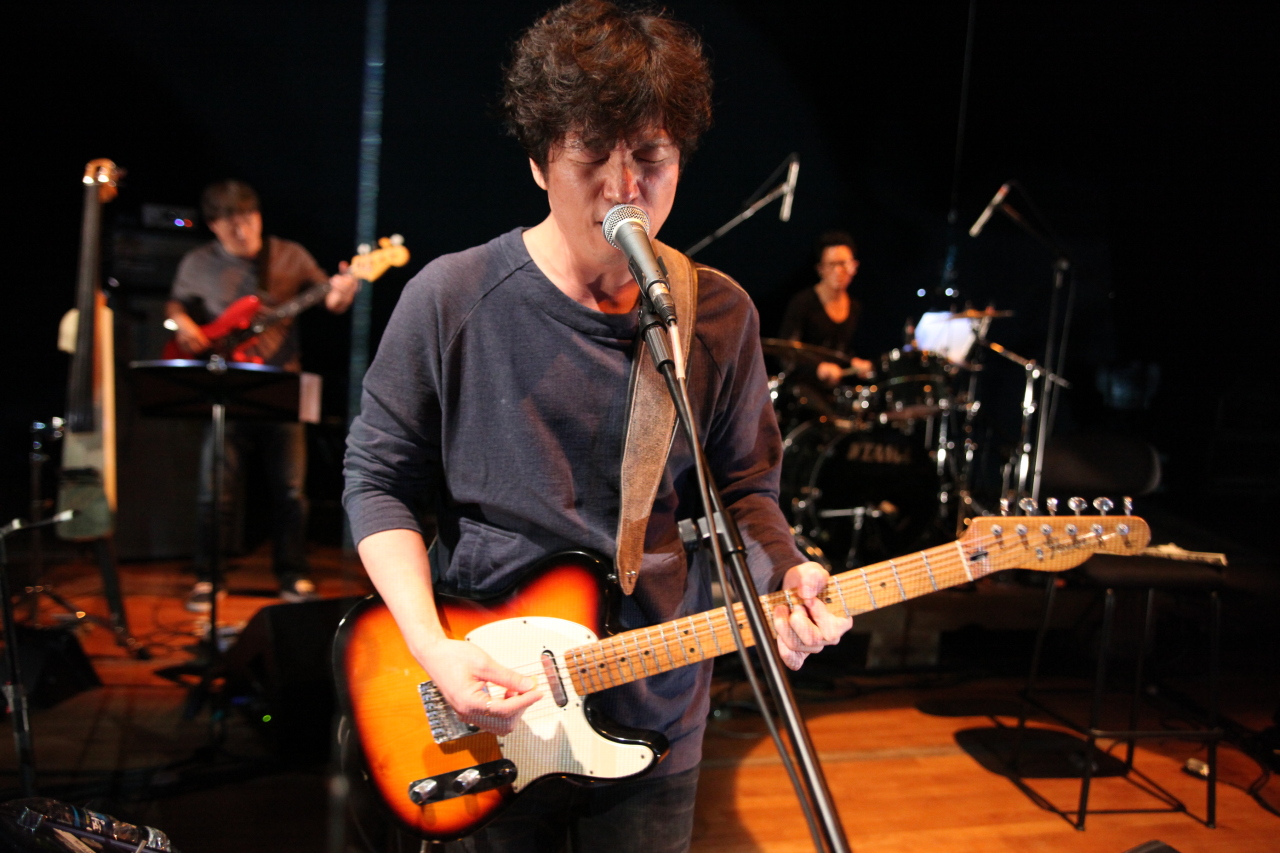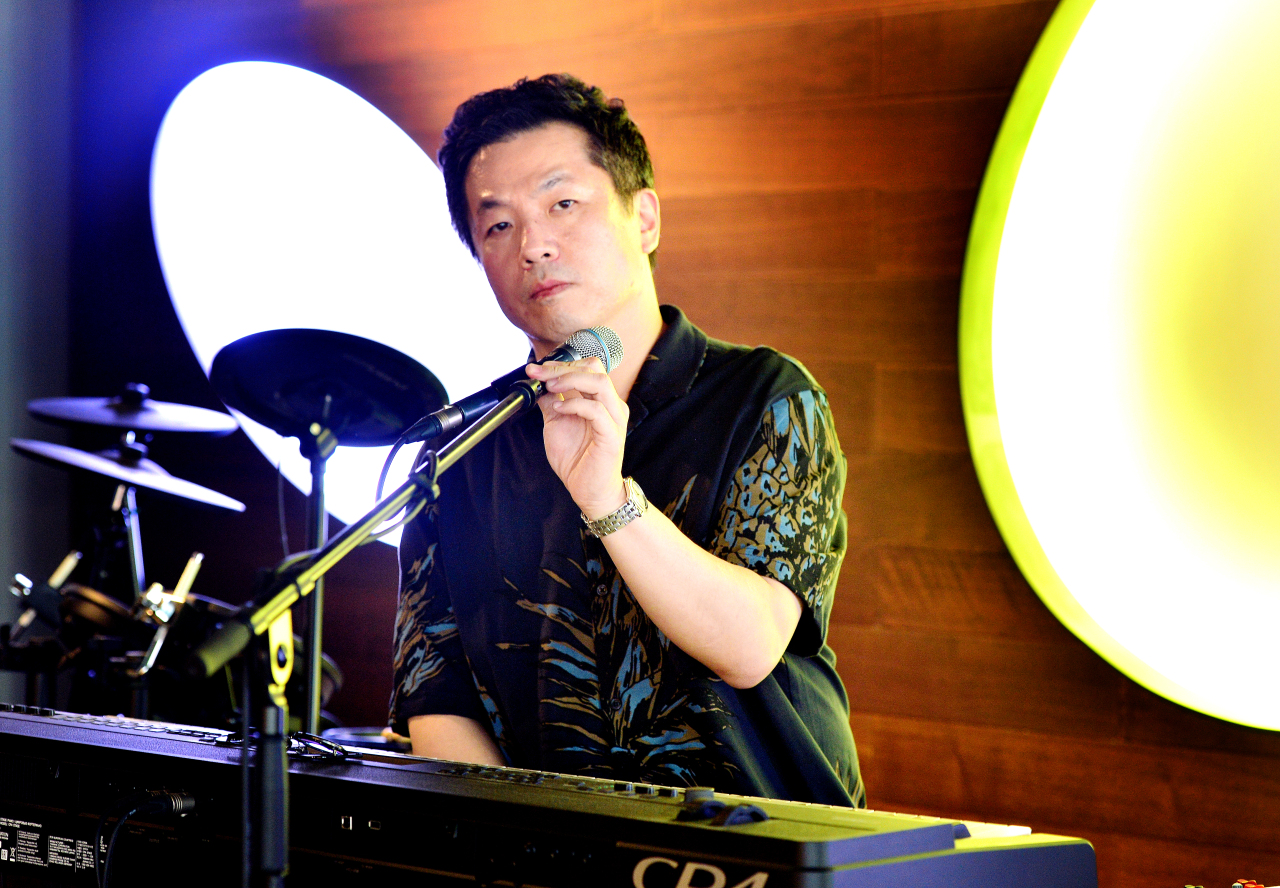[Eye Interview] Journeying the world on wings of music
Singer Yi Sung-yol takes listeners to exotic, unfamiliar lands with music from around the world
By Kim Hoo-ranPublished : June 26, 2020 - 09:31

This year was to have been my “big” travel year.
The ambitious plan included two weeks in Tuscany, basking in the autumn sun and sauntering the streets of Florence. Having decided on the destination, I followed Instagram pictures of Italy in all their golden and azure glory, and had Rai Radio Tutta Italiana as background noise, the music on the Italian radio station transporting me thousands of miles away to a place that sounded full of life and joy. I served panettone on Christmas, forgoing setting a Christmas pudding aflame.
Then the novel coronavirus happened. It effectively shut down most international travel as countries closed off borders. Italy bore the brunt of the COVID-19 pandemic in the early months and I stopped listening to the Italian radio, disheartened by the tragedy and the fact that Italy would be out of the question for quite some time.
I then sought solace elsewhere. Listening to EBS Radio’s “World Music Travel,” one is transported to countries around the globe, border closures notwithstanding. Music literally transcends borders.
Leading the legion of loyal followers in this world travel is singer Yi Sung-yol. And who better than Yi as a guide to lead you through the rich offerings of diverse music from around the world. The musician, often called a singer’s singer, has been keeping his fans on their toes ever since his debut in Korea in 1994, as a member of rock band duo and subsequently a solo artist, each new album opening up new vistas.
The music program, which airs 2 p.m. to 4 p.m. daily with repeat broadcasts starting at 10 p.m., is a kaleidoscope of musical offerings from different countries, although by Yi’s own admission, they are well-known pieces in the parts of the world from which they hail. “The producer keeps it to the top 10s, top 20s,” said Yi during an interview with The Korea Herald at a cafe in Seoul earlier this month. As for the preponderance of songs in Spanish, Yi explains that the Latin music market is larger than the English-language music market.
Yet a variety is ensured through different programming each day of the week. For example, lesser-known, obscure indie musicians are featured on Tuesdays while on Fridays, jazz music selected by the publisher of the country’s top jazz magazine takes to the air.
The overarching principle in the selection of music is to aim for a mix while staying away from pieces that are too obscure, according to Yi.
Pleasant surprises are to be found in Yi’s own selections that are featured on Saturdays and Sundays. On a recent weekend, music by Mohsen Namjoo, a dissident artist from Iran, was a surprise discovery. “I like to listen to good singers singing in Farsi. Namjoo sings old Persian poetry written in the Middle Ages,” Yi explained in an email exchanged after the interview. “By the way, I do not speak or understand Persian!” he added.
The selection for that weekend had been titled “Music of Dissent” and featured an eclectic mix of music, from the aforementioned Persian songs to French rapper Keny Arkana’s “Desobeissance Civile” to Beethoven Symphony No. 3 “Eroica.” Beethoven had originally dedicated the piece to Napoleon Bonaparte, but scratched out his name from the manuscript when he heard that Napoleon had crowned himself the emperor of France. He then and titled it “Eroica” -- the heroic -- referring to the heroic in everyday people.

Yi has been hosting one radio show after another ever since he made a debut as a radio DJ in 2007. His shows have included an indie music program, which he hosted from 2014-2017, as well as a literary show in which he read out passages and played music to go with the literary selections. He also hosted a music program on KBTS TV Chuncheon for two or three years. He has been hosting “World Music Journey” since January 2018.
As a DJ, Yi gets to introduce and listen to other people’s music. “I get to meet a wide spectrum of musicians. It is an experience that cannot be had otherwise. It is something big that I gained,” Yi said.
As for his own music, Yi said, “After 2017, I got tired of thinking about the next album.” His sixth album, “Yosaedeurimyosae,” was released in 2017.
“I’ve been on a strike since 2017,” Yi said matter of factly. “I could be bored, nervous, but I am still listening to more than 20 music pieces a day, not all of which are 100 percent to my liking,” he added.
Asked what had prompted the strike, Yi quotes Irish poet William Butler Yeats. “What Yeats called a ‘lonely impulse of delight’ and in a similar light how Charles Bukowski said not to try,” Yi said. “I needed to stop, regroup and accept, or accept, regroup and stop.”
After saying that there is no motivation yet to resume music making, Yi said, “Incidentally, I was moved by a certain line from a book. I thought about bringing music to it,” he said, adding, “I am warming up for the job.”
Just because he is on strike does not mean that he is not thinking about music, it appears. “I am creating space to be able to focus. I am testing my focus now,” he said.
What would it take it to break his strike? “A nudge, an earthquake, or a change of heart,” he said.
Yi started out as a member of U&Me Blue, a modern rock band, formed with Bang Jun-seok, while he was a student at State University of New York Binghamton. “Bang said let’s go to Korea,” Yi recalled. “It had been just a hobby in the US,” he said about the band.
Yi landed in Seoul in 1993 and the two started out performing in Hongdae clubs. “That was one of the happiest moments in my adult life,” he said, a smile on his face.
The band’s two albums were critically acclaimed and would go on to win major Korean music awards, but the band disbanded after the second album and Yi returned to the US, as he had promised his mother. “I had promised my mother that I would find a job after three years,” he said.
There was not much a musician who had returned from Korea could do in the US at the time, as the economy was gripped by a global downturn, Yi recalled. At one point, he worked nightshifts at a convenience store and it was by “pure happenstance,” to use his own words, that he got in touch with a producer from Korea. He returned to Seoul and released his first solo album in 2003.
There is no discernable continuum in Yi’s six albums so far, each album a departure from the previous one, often a radical departure. Indeed, he does not strive for a forced continuum, Yi explained, preferring, instead, a natural flow.
“Music is essentially primordial. Whether it be joy or ‘han,’ I have to want to vocalize it,” he said. “Then they just come out, although I don’t know what the catalyst is,” he said. In Yi’s view, a musician is a medium. “You ‘receive’ your ideas,” he said
Yi likened music writing to piecing together a puzzle. “Hanging on to the thread, it somehow gets finished,” he said.
His lyrics, which he describes as a hodgepodge of languages, are anything but. The soul-stirring lyrics are part of what sets Yi’s music apart.
Yi described himself as near dyslexic and claimed he is not a well-read person, but that should be taken as a statement of modesty, coming as it does from someone who cites De Quincey, Bukowski, Yeats, Tokarczuk and McCarthy, as among “many writers who intrigue me.” Indeed, literary influences abound in music “Black Leaf” in his sixth album references a poem by late poet Ki Hyeong-do, for instance.
Talking about the music scene in Korea today, Yi turns cynical. “The music industry as an industry is something I abhor,” he said, emphasizing the English word abhor for effect. “There is no place for me.” Perhaps Yi disenchantment with the industry is partly responsible for the current strike.
Yi’s music is appreciated by fans and critics alike for their bold experiments, attempts at something different. Yet, Yi is dismissive about such aspects of his music. “It doesn’t really mean anything,” Yi observed, adding, “Now, trend engulfs everything.”
“I don’t take music seriously enough these days,” he said. After all, what is the point in taking it too seriously when music has to remain in the background, he asked with a twinge of sarcasm.
Yet, Yi clearly appears to want to be moved by music. “I have respect for certain works. I am in awe every time I spend time with such content.”
Yi is an enigmatic person as is his music. He does not use social media and when he was handed over his Twitter handle by his label, he unfollowed most of the accounts, much to the dismay of the label. “You don’t unfollow unless they are psychopaths or mass murders, the agency told me,” Yi said with a chuckle.
Yi was resolute in his disavowal of social media. “I am not going to chase after something I am denied,” he said.
What does a musician on strike do during the time of the new coronavirus?
Yi is on a journey of another kind, watching Hindi thrillers on Netflix.
As for what he would like to do when the pandemic is all over, the man dubbed the “god father of Korea’s modern rock” harbors a rather refreshing wish. “The first thing I would do is go to the sauna at midnight!”
By Kim Hoo-ran (khooran@heraldcorp.com)








![[Kim Seong-kon] Democracy and the future of South Korea](http://res.heraldm.com/phpwas/restmb_idxmake.php?idx=644&simg=/content/image/2024/04/16/20240416050802_0.jpg&u=)








![[KH Explains] Hyundai's full hybrid edge to pay off amid slow transition to pure EVs](http://res.heraldm.com/phpwas/restmb_idxmake.php?idx=652&simg=/content/image/2024/04/18/20240418050645_0.jpg&u=20240418181020)

![[Today’s K-pop] Zico drops snippet of collaboration with Jennie](http://res.heraldm.com/phpwas/restmb_idxmake.php?idx=642&simg=/content/image/2024/04/18/20240418050702_0.jpg&u=)